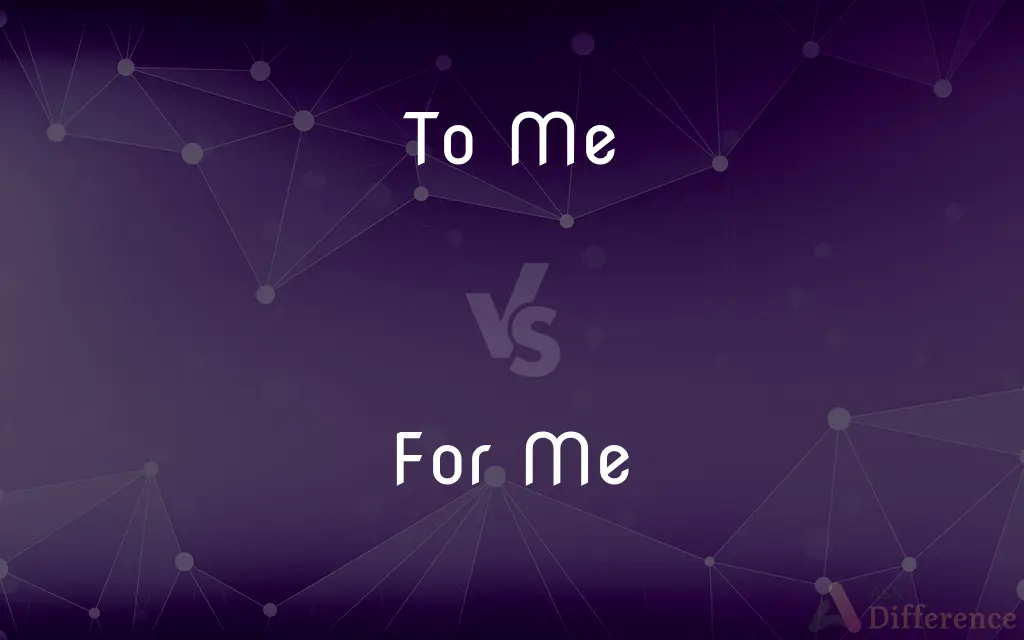To Me vs. For Me — What's the Difference?
By Tayyaba Rehman & Fiza Rafique — Published on December 4, 2024
"To me" often expresses personal opinion or perception, while "for me" indicates benefit or suitability to the speaker.

Difference Between To Me and For Me
Table of Contents
ADVERTISEMENT
Key Differences
"To me" is used when expressing a personal viewpoint or how something appears to an individual. It's subjective, focusing on personal interpretations or reactions to experiences. For example, saying "To me, this painting is incredibly moving" highlights how the speaker personally perceives the artwork, emphasizing the individual impact rather than a general assessment.
On the other hand, "for me" suggests benefit, relevance, or suitability to the speaker. It's used when something is considered favorable, convenient, or designed to meet the speaker's needs or preferences. When someone says, "This book is for me," they're indicating that the book suits their interests or needs, or that it was intended or designed with them in mind.
In communication, "to me" is often employed to introduce opinions or to soften statements, making them appear less objective and more about personal perception. It's a way of sharing one's thoughts without asserting them as universal truths. Conversely, "for me" can express a sense of personal advantage or suitability, often used in situations where the speaker is evaluating options or making decisions based on personal preference or benefit.
While "to me" invites a look into the speaker's subjective experience, "for me" offers insight into the speaker's personal needs, preferences, or what they stand to gain. Both phrases underscore the individuality of perception and preference, yet they serve different communicative purposes by distinguishing between personal interpretation and personal benefit.
Comparison Chart
Primary Use
Expressing personal opinion or perception.
Indicating benefit or suitability.
ADVERTISEMENT
Focus
Subjectivity and personal interpretation.
Personal advantage or suitability.
Contextual Usage
Often used to share personal views or to soften statements.
Used when something is favorable or specifically suited to the speaker.
Example Sentence
"To me, the movie was a masterpiece."
"This solution works perfectly for me."
Communication Aim
To convey personal impressions or feelings about something.
To express how something is beneficial or appropriate for the speaker.
Compare with Definitions
To Me
Highlighting individual interpretation.
To me, this symbolizes freedom.
For Me
Indicating personal benefit.
This job is perfect for me.
To Me
Prefacing opinions.
To me, their approach is innovative.
For Me
Signifying suitability.
This schedule works better for me.
To Me
Sharing subjective viewpoints.
The music sounds too loud to me.
For Me
Personal preference.
For me, coffee is a morning must-have.
To Me
Expressing personal perception.
To me, the story's moral was ambiguous.
For Me
Showing intended audience or recipient.
That message was specifically for me.
To Me
Softening statements.
To me, it seems like he's not interested.
For Me
Expressing personal needs.
For me, quiet is essential for concentration.
Common Curiosities
Can "to me" and "for me" be used interchangeably?
No, they serve different purposes; "to me" expresses personal viewpoints, while "for me" indicates personal benefit or suitability.
Does "for me" imply personal preference?
Yes, "for me" often implies personal preference or suitability.
Is "to me" subjective or objective?
"To me" is subjective, as it reflects personal opinions or perceptions.
Why is it important to distinguish between "to me" and "for me"?
Understanding the difference helps clarify whether a statement is about personal perception or personal benefit, improving communication accuracy.
Can "to me" be used in formal writing?
Yes, but it should be used carefully to ensure that personal opinions are appropriately framed.
What is an example of "to me" in a sentence?
"To me, this solution seems the most effective."
In what context would "to me" be most appropriate?
"To me" is appropriate in contexts where personal opinions or perceptions are being shared.
What does "to me" mean?
"To me" means according to my perception or opinion.
How is "for me" used?
"For me" is used to indicate something's benefit, suitability, or preference for the speaker.
When should "for me" be used?
"For me" should be used when expressing how something is beneficial, suitable, or preferred personally.
Is "for me" considered informal?
It can be used in both informal and formal contexts, depending on how it's applied.
Can "for me" be used to express opinions?
It can indirectly reflect opinions, especially regarding personal preferences or what suits someone best.
Give an example of "for me" being used.
"Online courses work better for me due to my schedule."
How do "to me" and "for me" affect the tone of a statement?
"To me" can make a statement appear more subjective and open to interpretation, while "for me" highlights personal relevance or preference.
How do these phrases contribute to personal expression?
They allow speakers to clearly convey whether they are sharing subjective viewpoints ("to me") or expressing what is personally beneficial or preferred ("for me").
Share Your Discovery

Previous Comparison
Super Glue vs. Epoxy
Next Comparison
Dallas vs. HoustonAuthor Spotlight
Written by
Tayyaba RehmanTayyaba Rehman is a distinguished writer, currently serving as a primary contributor to askdifference.com. As a researcher in semantics and etymology, Tayyaba's passion for the complexity of languages and their distinctions has found a perfect home on the platform. Tayyaba delves into the intricacies of language, distinguishing between commonly confused words and phrases, thereby providing clarity for readers worldwide.
Co-written by
Fiza RafiqueFiza Rafique is a skilled content writer at AskDifference.com, where she meticulously refines and enhances written pieces. Drawing from her vast editorial expertise, Fiza ensures clarity, accuracy, and precision in every article. Passionate about language, she continually seeks to elevate the quality of content for readers worldwide.













































